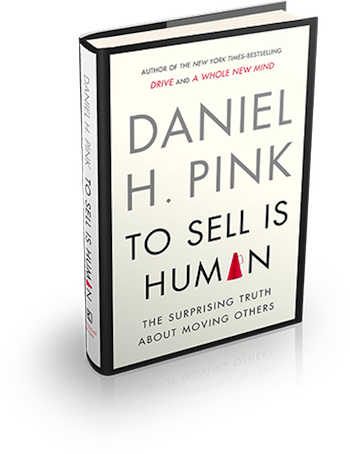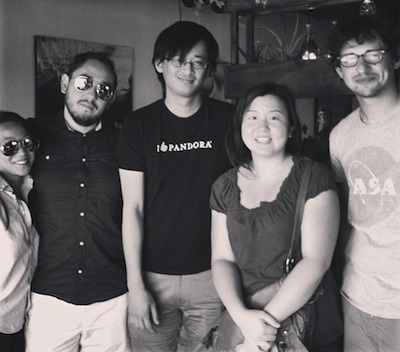This story is inspired by this week’s Startup Edition question: How did you raise money for your startup?
“Email Dan Pink.”
That task sat on my to-do list, undone for weeks. I somehow managed to move everything else around it to my done list while that one task languished. I was too scared to reach out.
If you don’t know who Dan Pink is, he’s a five-time bestselling author and thought leader on the changing world of work. His latest, To Sell is Human: The Surprising Truth About Moving Others, which gives a definitive look at modern sales, is a #1 New York Times business bestseller.
I had to sell to the guy who had literally written the book on selling.
I finally worked up the courage to send Dan an email, and we set up a call. Then, I gave him a horrible pitch — I fumbled my words and my nerves paved the way to tangents that made no sense. When we were done, I hung up, dejected and I felt sure that I’d blown it.
Even nerds like me have to sell in this new world of selling
No longer is selling the province of a specialized sales department. (Imagine if a startup had a team dedicated solely to fundraising!) We’re all selling now, and this is a point that Dan drives home in his book To Sell is Human.

It’s absolutely vital that our skill sets are “elastic,” that is, flexible and stretchable across functional boundaries and disciplines, because our jobs are neither as segmented nor discrete as they were in the past. Dan writes that “[a] world of flat organizations and tumultuous business conditions — and that’s our world —punishes fixed skills and prizes elastic ones.” Because business conditions are constantly shifting, companies need to be organized in nimble and agile ways, and they need to be comprised of people who can make adjustments on the fly.
Dan points to business software company Atlassian whose entire company is organized around this notion of elasticity, from the way the company is organized internally to the way that it interacts with customers.
Atlassian is totally different from other enterprise software companies in how their product is bought and sold. At your typical enterprise software vendor, the relationship begins with a visit from the vendor to the potential customer, prospecting for new business. But at Atlassian, they don’t even employ a single salesperson to source customers or pay those kind of house calls.
The customer relationship begins when they learn about Atlassian, visit the website, and are immediately able to sign up for a trial. Afterward, the customer might have questions or reach out for help, and Atlassian’s support team is there to answer questions and their engineers are there to fix bugs. What they don’t have is a sales team that badgers you to commit.
As Dan puts it, at Atlassian, sales “isn’t anyone’s job. It’s everyone’s job.” And that transformation goes hand-in-hand with the inversion of the sales process: don’t sell, serve.
How We Sold to Dan Through service
As happens with Atlassian, our relationship with Dan began two years ago, when something simple and amazing happened — Dan signed up for iDoneThis, tried it, and loved it.

He became the kind of supporter young startups dream about. He blogged about us, talked about us at conferences, and recommended us to his loyal following. He even took time out to talk with us on the phone a couple of times, and it turns out that he’s not only a tremendous writer, he’s also a keen product guy.
But there’s a huge gap between loving a free product and paying for a product, much less investing money in the product. That’s what had me daunted, and after the pitch on the phone, I thought I’d blown an incredible opportunity to get Dan on board.
But then, Dan started following up with questions.
He wanted to take a deeper dive into the terms of the convertible note, because he had never angel invested before. I knew this was important because Dan was trained as a lawyer — at Yale Law School, no less — and his wife is also a DC lawyer, and for lawyers, legalities can be a major hesitation point.
Fortunately, in our corner, we have probably the best early-stage lawyer in Silicon Valley, Yokum Taku at Wilson Sonsini. Yokum kindly offered to get on the phone and discuss the terms of the investment until they felt comfortable with it. After their conversation, I could tell that the legal question had receded as a hesitation point, thanks to Yokum.
I didn’t hear from Dan for a few weeks. Then, he emailed me. He was in. Dan wrote, “I figure a product I’ve used every day for 2 years has something going for it!”
A Modern Sell
Every fundraising announcement contains a list of famous investors who’ve come on board, but I’ve never seen a fundraising announcement that lists the people behind the scenes who helped make the round happen. I thought I had to be that kind of polished, untouchable fundraising magnet of a founder I could never even hope to be.

Yet it wasn’t me, the pitchman, that was the focal point of this deal. In fact, Dan invested in spite of my ability to sell and instead, because our engineers Rodrigo and Tony built the product, our support guru Ginni offered support, and our lawyer Yokum explained the legal issues.
From the beginning, we’d set out to move people through service and to put people first — from our customers to our own employees, and we saw the kind of modern selling that Dan writes about in action. It wasn’t me, the silver-tongued salesman who persuaded Dan. Rather, it was empowering and gratifying to feel that it was the force of the whole organization working together that convinced Dan to join us.
Learn how other entrepreneurs raised their money for their startup at Startup Edition.
